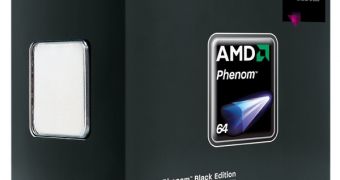Before Intel even has a chance to ship the first next-generation Nehalem processors, competitor AMD is bound to update its CPU offering with new triple-core Phenoms designed for high-performance. The new CPUs will not be able to compete with Intel's newly released high-end processors, but they do allow AMD to get hold of a significant share of the CPU market, where Intel is currently very well positioned.
The Sunnyvale-based chip maker plans to release its biggest-performance triple-core Phenom yet, with the introduction of the Phenom X3 8850 model. As you might have expected, this new CPU will be manufactured on a 65nm process technology, as AMD is yet to unveil its very first 45nm-built Phenom CPU. The upcoming processor will be designed to support AM2+ platforms, and will come with a 2.5GHz core speed. Other technical details include a TDP level of 95W and 2MB of L3 cache.
Despite no official details being available right now, the Phenom X3 8850 will become the first triple-core Phenom processor to be part of the company's Black Edition series. The X3 8850 will obviously have an unlocked multiplier, which means it stands great chances of soon becoming a favorite product with overclocking enthusiasts. Unfortunately, there is no word yet on pricing for it.
As far as Intel is concerned, recent reports indicate that the Santa Clara-based chip maker is experiencing some problems with delivering the first Socket 1160 Havendale CPUs, which will be built on the Nehalem technology, and will provide integrated graphics support. Until just recently, these processors were expected to be released with the Lynnfield CPU in Q3 2009, but as it now turns out, Intel will not be ready to supply the first Havendales until early Q1 2010.
In addition, this delay could also affect the notebook-oriented Auburndale CPUs, which could ultimately be nothing short of great news for competitor AMD, seeing how it is planning to release its graphics-capable Swift chips in the second half of 2009.

 14 DAY TRIAL //
14 DAY TRIAL //